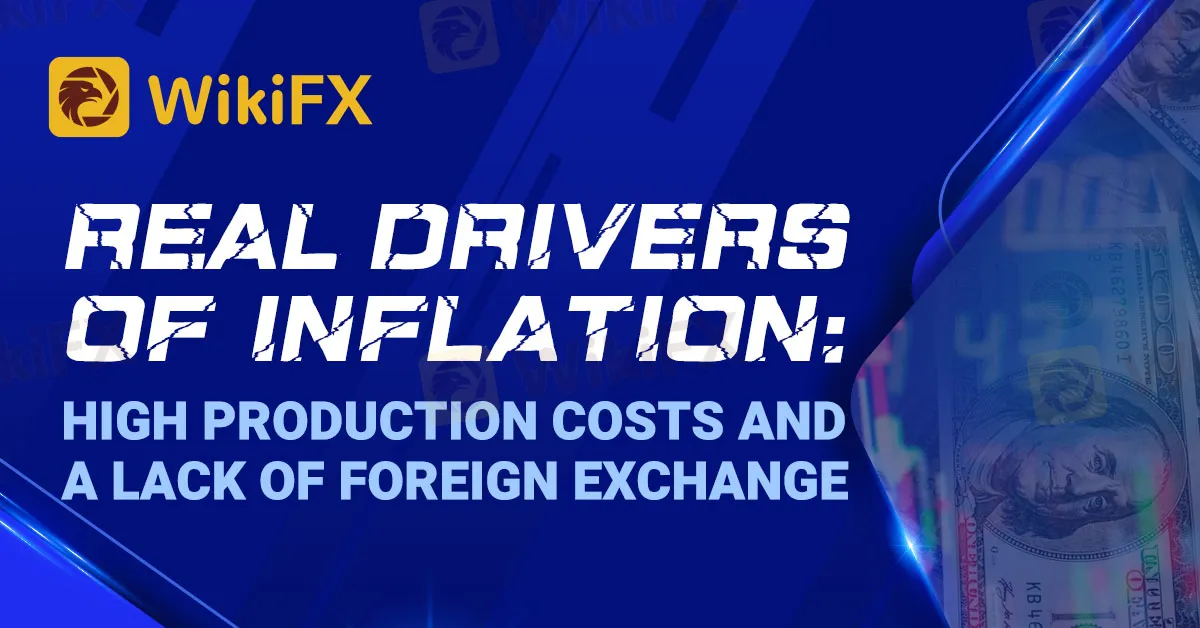简体中文
繁體中文
English
Pусский
日本語
ภาษาไทย
Tiếng Việt
Bahasa Indonesia
Español
हिन्दी
Filippiiniläinen
Français
Deutsch
Português
Türkçe
한국어
العربية
REAL DRIVERS OF INFLATION: HIGH PRODUCTION COSTS AND A LACK OF FOREIGN EXCHANGE
Abstract:A global decentralized or over-the-counter market for trading currencies is known as the foreign exchange market. For every currency, exchange rates are set by this market. It covers all facets of purchasing, selling, and exchanging currencies at established or current rates.

A global decentralized or over-the-counter market for trading currencies is known as the foreign exchange market. For every currency, exchange rates are set by this market. It covers all facets of purchasing, selling, and exchanging currencies at established or current rates.
According to the Manufacturers Association of Nigeria (MAN), among other things, low forex availability and rising production costs are the main causes of inflation in the nation. High import costs are also a result of the Naira's depreciation.
According to Mr. Segun Ajayi-Kadir, Director General of MAN, revamping the naira and dealing in the currency outside banks (CoB) may not have the impact on inflation that the Central Bank of Nigeria had hoped for (CBN).
He mentioned that the National Bureau of Statistics (NBS) ascribed the jump in headline inflation in January to disruptions in the supply of food items, increases in import costs due to the depreciation of the Naira, and a pervasive increase in the cost of manufacturing.
“This is contrary to the expectation of CBN that the currency redesign will help to tame inflation by bringing the hoarded currency into the banking system and giving CBN the opportunity to establish effective management of the monetary policy,” he said. It is clear at this point that altering the currency and bringing in money from outside the banking system may not significantly reduce inflation.
The amount of actual money in circulation now only accounts for 6.8% of the overall amount of money used to support the country's economy. This means that the amount of money represented through instruments like deposits and bonds, for example, greatly outweighs the amount of actual money. Furthermore, since more than 20 years ago, 85% of our currency has been in circulation outside of banks.
Production and a variety of other well-known issues are what actually fuel inflation. You can clearly see how increased insecurity has hampered food production, leading to food inflation, in particular. High importation and a lack of foreign exchange are two more.
Therefore, in order to reduce food inflation, it is necessary to address the real issues that drive inflation by giving manufacturing a higher priority when allocating foreign exchange, expanding and deepening special funding windows for the real sector, and resolutely tackling the problem of insecurity.
Among other goals of the CBN, the currency redesign aims to control inflation, which has recently taken on a worrying dimension. The CBN report, which claimed that 70% of CoB had been sucked in, should be commended for the success of the apex bank's cashless strategy. But when it comes to inflation, a different scenario is taking place.
It's possible that we're still in the early stages of the assessment process and will need to wait a bit before we fully understand the ramifications or results of the policy. This is especially true now that the currency change has been implemented slowly and caused unneeded disturbance to people's daily lives and companies. Already, we are observing a decline of more than 25% in sales of goods produced locally.

Disclaimer:
The views in this article only represent the author's personal views, and do not constitute investment advice on this platform. This platform does not guarantee the accuracy, completeness and timeliness of the information in the article, and will not be liable for any loss caused by the use of or reliance on the information in the article.
Read more

5 Risks associated with Grand Capital
You can avoid fraud, crypto scams, and similar traps simply by staying informed. If you regularly follow forex news, there’s a lower chance that you’ll fall victim to such scams. Being aware is the only way to stay safe. That’s why you also need to know about the Grand Capital broker and why it should avoided.

Avoid Trendify: 5 Red Flags Revealed
Trendify is nothing more than a scam broker. It is one of those forex brokers that acts genuine but is actually full of red flags. Before you invest and fall victim to its investment scam, its better to check out the risks involved with Trendify.

10 Unlicensed Brokers Exposed – Check Now to Stay Safe!
Traders need to stay informed, as scam brokers are active in the forex market. It's a basic rule for forex beginners to stay updated and check the Warning List. Here is the Warning List of unauthorized brokers you should avoid.

ThinkMarkets Unlocks More Weekend Crypto Trading Time
ThinkMarkets enhances crypto trading with significantly reduced weekend maintenance, offering traders greater access and an improved experience.
WikiFX Broker
Latest News
Forex Hedging: Is It a Trader’s Safety Net or Just an Illusion?
OPEC+ members agree larger-than-expected oil production hike in August
FCA clarifies expectations on bullying, harassment and violence to deepen trust in financial service
Asia-Pacific markets mixed after Trump shifts goalposts on tariffs again
XS.com Expands Global Reach with Landmark Kuwait Launch
European markets set to open mixed amid fresh U.S. tariff threats
Top Wall Street analysts are pounding the table on these 3 stocks
Stock futures fall after Trump team says tariffs will go into effect on Aug. 1: Live updates
10 Unlicensed Brokers Exposed – Check Now to Stay Safe!
S&P 500 futures fall slightly as Trump threatens new tariffs, Tesla shares drop: Live updates
Currency Calculator


